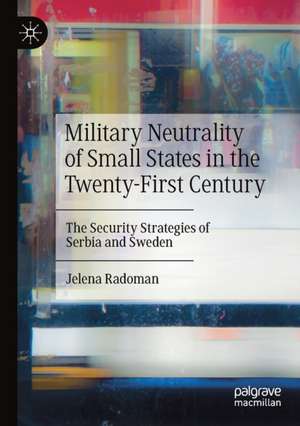Military Neutrality of Small States in the Twenty-First Century: The Security Strategies of Serbia and Sweden
Autor Jelena Radomanen Limba Engleză Paperback – 30 aug 2022
| Toate formatele și edițiile | Preț | Express |
|---|---|---|
| Paperback (1) | 725.01 lei 6-8 săpt. | |
| Springer International Publishing – 30 aug 2022 | 725.01 lei 6-8 săpt. | |
| Hardback (1) | 729.33 lei 6-8 săpt. | |
| Springer International Publishing – 29 aug 2021 | 729.33 lei 6-8 săpt. |
Preț: 725.01 lei
Preț vechi: 884.16 lei
-18% Nou
Puncte Express: 1088
Preț estimativ în valută:
138.73€ • 144.56$ • 114.87£
138.73€ • 144.56$ • 114.87£
Carte tipărită la comandă
Livrare economică 03-17 aprilie
Preluare comenzi: 021 569.72.76
Specificații
ISBN-13: 9783030805975
ISBN-10: 3030805972
Ilustrații: VII, 270 p. 1 illus.
Dimensiuni: 148 x 210 mm
Greutate: 0.37 kg
Ediția:1st ed. 2021
Editura: Springer International Publishing
Colecția Palgrave Macmillan
Locul publicării:Cham, Switzerland
ISBN-10: 3030805972
Ilustrații: VII, 270 p. 1 illus.
Dimensiuni: 148 x 210 mm
Greutate: 0.37 kg
Ediția:1st ed. 2021
Editura: Springer International Publishing
Colecția Palgrave Macmillan
Locul publicării:Cham, Switzerland
Cuprins
Chapter 1. Introduction.- Chapter 2. The Theoretical Model.- Chapter 3. Historical Experience of War.- Chapter 4. Threat Perceptions.- Chapter 5. Internal Political Dynamics.- Chapter 6. Conclusion.
Notă biografică
Jelena Radoman holds a PhD in International Relations from the University of Belgrade, Serbia. She worked on issues related to security sector reform and security integrations and held consultancy positions for a number of international organizations in the Western Balkans. She currently works as Senior Officer for Security and Stability at the Dutch Ministry of Foreign Affairs, Embassy in Belgrade, Serbia.
Textul de pe ultima copertă
“Small states can make a big difference for an entire region not only for their potential nuicence value, but also for their active contributions to uphold international order from a neutral or buffer-state position. This book is very valuable for its concrete discussions of exactly how this has played out, particularly in post-Cold War Europe.”
–Iver B. Neumann, Co-editor of Small State Status-Seeking
“Arguably, most of the states of the world are neither great powers nor middle powers, rather small states. Most of these small states are not members of military alliances. In her book, Radoman, goes in-depth analysing this universal phenomenon, hence presenting new and most welcomed knowledge. She presents valuable insights in the fields of Foreign Policy Analysis as well as Strategic Studies.”
–Håkan Edström, Associate Professor in Political Science and Senior Lecturer in War Studies, Swedish National Defence University, Stockholm, Sweden
“If you want to know why states still opt for military neutrality in the twenty-first century, this is a book for you! To explain how two very different states, Sweden and Serbia, adopted a similar policy, Radoman draws on an eclectic theoretical framework. The book will also be a real treat for anyone interested in small states and their defense policies and European security more generally.”
– Filip Ejdus, Associate Professor, Faculty of Political Science, University of Belgrade, Serbia
This book explores the factors that account for military neutrality as a security strategy for small states. Through comparing the cases of Serbia and Sweden the book introduces a novel conceptual framework that is built against existing knowledge in the small states and military neutrality literature. Drawing on different theoretical frameworks, the model explains why certain small states choose to stay outside of military alliances in the twenty-first century.
Jelena Radoman holds a PhD in International Relations from the University of Belgrade, Serbia. Her work is related to security sector reform and security integrations. She currently works for the Dutch Ministry of Foreign Affairs, Embassy in Belgrade.
–Iver B. Neumann, Co-editor of Small State Status-Seeking
“Arguably, most of the states of the world are neither great powers nor middle powers, rather small states. Most of these small states are not members of military alliances. In her book, Radoman, goes in-depth analysing this universal phenomenon, hence presenting new and most welcomed knowledge. She presents valuable insights in the fields of Foreign Policy Analysis as well as Strategic Studies.”
–Håkan Edström, Associate Professor in Political Science and Senior Lecturer in War Studies, Swedish National Defence University, Stockholm, Sweden
“If you want to know why states still opt for military neutrality in the twenty-first century, this is a book for you! To explain how two very different states, Sweden and Serbia, adopted a similar policy, Radoman draws on an eclectic theoretical framework. The book will also be a real treat for anyone interested in small states and their defense policies and European security more generally.”
– Filip Ejdus, Associate Professor, Faculty of Political Science, University of Belgrade, Serbia
This book explores the factors that account for military neutrality as a security strategy for small states. Through comparing the cases of Serbia and Sweden the book introduces a novel conceptual framework that is built against existing knowledge in the small states and military neutrality literature. Drawing on different theoretical frameworks, the model explains why certain small states choose to stay outside of military alliances in the twenty-first century.
Jelena Radoman holds a PhD in International Relations from the University of Belgrade, Serbia. Her work is related to security sector reform and security integrations. She currently works for the Dutch Ministry of Foreign Affairs, Embassy in Belgrade.
Caracteristici
Offers an updated study of why states choose neutrality as a security option in the twenty-first century Introduces a novel theoretical framework that synthesizes previous research and different theoretical traditions Contributes to studies on the Western Balkans in the small state literature
